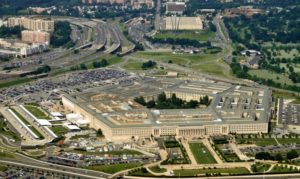
Even during budget crises, federal law empowers agencies to use appropriations to defend civil cases.
This most recent government shutdown was the longest ever, but it was only partial. Many agencies—including the U.S. Departments of Energy, Defense, Labor, and others—had already received appropriations for 2019. Those agencies continued to operate normally—except when they were affected by the shutdown of other agencies.
The U.S. Department of Justice, for example, was not funded. Justice Department litigators were supposed to request stays or postponements in all active civil cases. Although some courts rejected—even scorned—those requests, many have granted them. Such delays can be costly to those litigating against the government. Even if the shutdown had ended quickly, a short postponement would have put a case months later on the calendar, with prolonged uncertainty about whether the litigants would receive the payments they are claiming or be obligated to pay government-imposed penalties.
If a private party’s lawyer disappeared from a case because the client refused to pay, there would be consequences. Ordinarily, the analogous result would not hold for the government, for several reasons. For most agencies—those without independent litigating authority—litigation counsel are usually paid through the Justice Department’s appropriation, so an agency is not like a client that fails to pay. And, arguably, the government as civil defendant should face no adverse consequences from a complete absence of annual appropriations. The government, as sovereign, can disallow most types of lawsuits against it. A refusal to appropriate funds is an unorthodox mechanism. Yet it would seem improper to decide against the government when—notwithstanding statutes that waive sovereign immunity—federal law bars the government’s participation in the case.
But these were not ordinary times. Given the partial appropriations, this was not even an “ordinary” shutdown. If an agency were engaged in civil litigation involving a program with an appropriation, the agency should be able to fund the defense. The agency could use an Economy Act agreement to pay its Justice Department attorneys.
To be clear, the appropriated agency is truly the party interested in a litigation. Although the Justice Department controls litigating positions and strategies, in other respects the department treats litigating agencies as “client agencies.” It expects them to support litigation through tasks like fact development, just as a private defendant must do. And a judgment—whether an injunction or a money judgment—is directed to the agency defendant.
Accordingly, in any future shutdowns, expenses for litigation counsel ought to be a permissible use of agency appropriations. Appropriations can be used for expenses that “make a direct contribution to carrying out…an authorized agency function,” are not “prohibited by law,” and are not “otherwise provided for” in other appropriations. When a lawsuit would affect how an agency carries out its work—or, for affirmative litigation, would be part of the agency’s work—handling the lawsuit certainly seems like a “direct contribution” warranting the use of appropriated funds.
Indeed, the U.S. Government Accountability Office (GAO) has repeatedly said that, in certain circumstances, agencies can pay attorneys to defend lawsuits against officials. If those defenses “make a direct contribution,” the same conclusion should hold for litigation that directly involves programs or operations.
The usual bar to agencies funding their own litigation is that “the conduct of litigation in which the United States, an agency, or an officer thereof is a party…is reserved to the officers of the Department of Justice.” But GAO has acknowledged that agency appropriations are available “for uses consistent with the litigative policies established” by the Justice Department. GAO has allowed agencies, “in certain situations, to use their appropriations to provide litigative services with respect to their own employees and operations.”
For example, a former employee of the U.S. Small Business Administration (SBA) was sued over his official actions, and the relevant U.S. Attorney undertook the defense. For various reasons, the U.S. Attorney withdrew, even though the Justice Department still considered federal representation was appropriate. GAO allowed the SBA to reimburse the former employee for private counsel he retained after the government withdrew. The limitations on agencies’ paying for legal defense “would not be a bar to reimbursement,” GAO said, because Justice Department representation was appropriate but “unavailable.”
Similarly, in the latest shutdown, Justice Department attorneys became effectively unavailable to represent agencies in civil litigation. Under that standard, an agency should be able to pay for its own lawyers.
Granted, these GAO opinions have typically involved reimbursement for employees’ litigation defense. They do not directly address the rule that an agency “may not employ an attorney…for the conduct of litigation in which…an agency…is a party.”
But providing funds for the Justice Department to employ attorneys should not violate that rule. GAO has explained that “the limitations on the use of agency appropriations to provide litigative services…were intended to reinforce Justice’s control of the conduct of litigation involving the United States.” Providing funding for Justice Department operations would not conflict with that purpose.
The Economy Act, under which an agency can request and pay for another agency’s work, should permit that arrangement. The expenses incurred for the work—the salaries for the Justice Department litigators—are paid from the appropriation of the agency requesting the work. Although an Economy Act transaction cannot be used to augment the appropriations of the agency performing the work, GAO has concluded that shifting of litigation costs does not augment Justice Department appropriations. Even if some technicality about carrying out Economy Act transactions might conceivably end up blocking such an arrangement, agencies that had appropriations during the shutdown should have the responsibility to explain why an arrangement like the one discussed here would not have been possible.
Thus, despite a shutdown, an agency can still prosecute or defend litigation involving a program or component for which appropriated funds are available. The implications for pending cases are striking. During the recent shutdown, Justice Department attorneys seemed to resist participation in all civil litigation, for all agencies. But for those agencies that have appropriations, a shutdown is not a real excuse for not litigating their cases vigorously.




